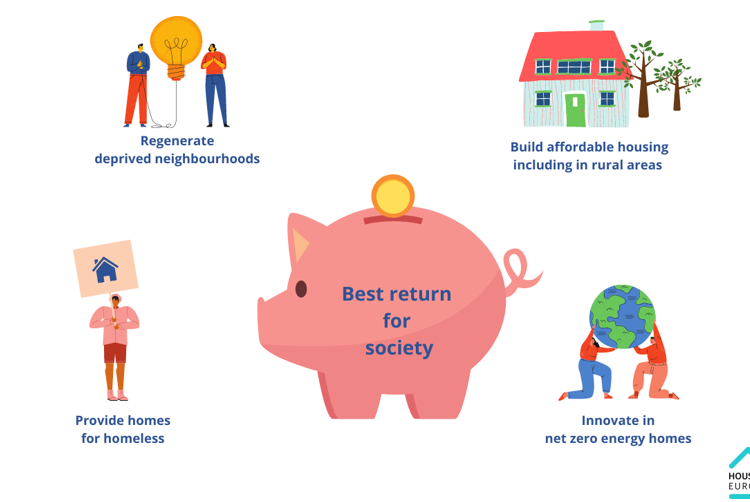Together with the Socialists & Democrats group, co-hosted by MEP Estrella Dura, Housing Europe organised a webinar dedicated to the role of our social, housing and affordable housing providers and the European Parliament in implementing the right to housing in its ever-present urgency. We were joined by Laurent Ghekiere, Chair of the Housing Europe Observatory, AVS Director-General Maria Montes Miguel, Director of FEANTSA Freek Spinnewij and Silvia Ganzerla – Policy Director of EUROCITIES.
Having to stay at home when homes are inadequate, exposes tenants to multiple stress factors impacting energy consumption and an increased risk for energy poverty, accessibility deficits, health hazardous design and in neighbour community environments.
The repercussions of the Covid-19 crisis have shown ever more that the right to housing is incremental to the quality of our living conditions, our health and furthermore the value systems of our societies at large. Social, cooperative and public housing providers have historically played a key role in rebuilding our societies after major crisis events and precarious socio-economic periods. They function as direct deliverers of the right to housing, implementing the latter therefore needs active support and investment in the sector. Recovery strategies must one hand focus on the continuity of services to protect local communities on an everyday basis and on the other hand guarantee stable investment and renovation schemes.
What can the EU do to help making the Right to Housing real by supporting these providers? We have gathered some ideas below:
- Specific portal or platform to get easier access to centrally managed EU funds and EIB products
- EU programme for the regeneration of neighbourhoods as part of a social green deal
- Reduction of the co-financing requirements (for EIB loans and European Structural and Investment Funds) for social, cooperative and public housing projects
- Simplification of rules (e.g. public procurement, state aid)
- Clear incentive from the European Commission towards MS and regions to include social, coop and public housing in their priorities for the European Structural Funds and national recovery plans
Key actions that policy makers have to take need to be based on a clear roadmap, in order to reduce administrative and legal burdens and consider affordable housing as a priority in European Structural Funds.
- Financial resources for a renovation and rehabilitation plan, and the construction of passive buildings. (Constructive scope, Comfort and health scope, Energy poverty scope)
- Change the rules:
Legislation should guarantee friendly and comfortable conditions that all dwellings or residential buildings must meet in order to be considered as people’s accommodation. Urban planning rules should align with these to promote socially and environmentally sustainable neighbourhoods.
- Focus on and commitment to social housing:
The added value goes beyond the delivery of the dwelling. Social housing providers are key actors in the construction of sustainable cities, therefore they have to become allies for policy makers. For instance the Housing Ministry in Spain is participating in the framework of the strategy for homeless people, and is already designing the future National Housing Plan, which will include the 20,000 affordable housing plan with a special focus on access to housing for the most disadvantaged groups. Spanish member AVS has provided the proposal document for this. Homelessness across Europe has increased by 70% in the last 10 years, without counting the impact of the pandemic. FEANTSA sees social housing as the adequate answer in tackling the problem with the help of the COVID19 recovery package and the MFF framework.
Finally we need to consider housing as living, meaning it doesn’t stop at providing a dwelling. Affordable housing providers are at the forefront in delivering the conditions for a better life. We are talking about added value services, in form of a cross-sectoral “Housing Plus” approach, that includes social support and social accompaniment.
